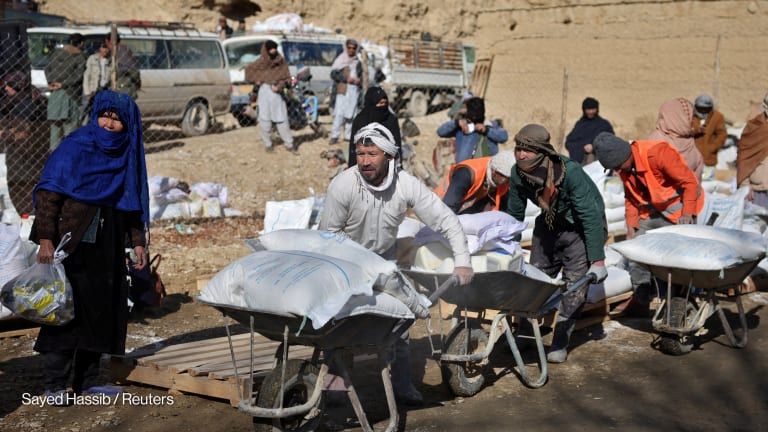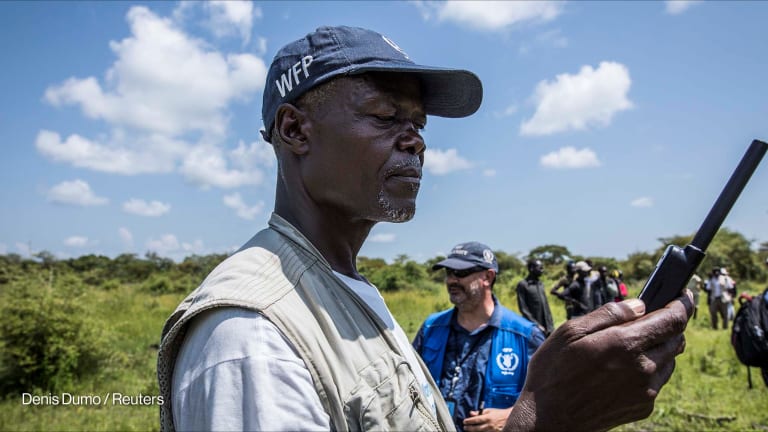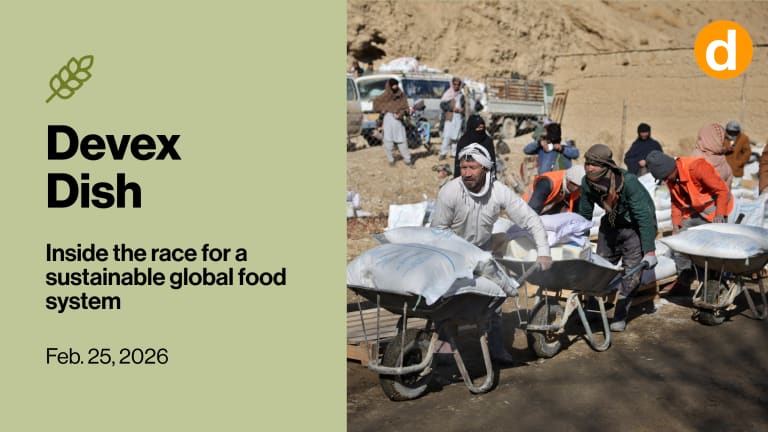
Many aid organizations that have operated in Afghanistan for 20 years or more say they are determined to carry out their missions across the country, with key staff members vowing to maintain operations to whatever extent possible as the humanitarian situation worsens.
Thousands of displaced people have been pouring into Kabul from areas around the nation, many fleeing with few belongings and little cash. Aid workers say their priorities are shifting from existing programming toward emergency assistance, including cash grants to help displaced people buy basic goods.
“Truckloads of people are arriving every day. People are arriving with very little, packed onto trucks and buses,” said Eileen McCarthy, advocacy manager with the Norwegian Refugee Council, speaking with Devex on Saturday just hours before the Taliban fully took over Kabul.
“It’s now a time for the humanitarian sector to be here and to serve.”
— Marianne O’Grady, deputy country director in Afghanistan, CAREThe people are fleeing violence and disorder amid the chaotic U.S. withdrawal from the country, nearly two decades after it first invaded. The Taliban have quickly advanced in recent weeks, seizing provincial capitals, border crossings, and ultimately Kabul itself Sunday after Afghan President Ashraf Ghani and other top officials fled abroad.
McCarthy said that the situation was a “huge challenge” and that NRC was working to shift its resources to emergency response to ensure basic needs are met.
Donors should also give aid organizations flexibility in how to spend money during this crisis, she said.
Aid workers have reported that people are forming new encampments and living out in the open in Kabul, with food, water, and medical care among the most urgent priorities. Most of the displaced are women and younger children. On top of specific needs such as hygiene kits, they might need additional assistance to survive.
“People are without means. So people need food. They need water,” said Ram Kishan, Mercy Corps’ deputy regional director for Asia, speaking from Kabul. “They are living under open sky, with no protection.”
Aid organizations say their long-standing presence in the country, as well as previous interactions with armed groups, has given them the means to continue to operate even as the Taliban solidify their control.
The United Nations said the humanitarian aid sector was able to continue its work, providing health care services at two camps for displaced people in Kabul over the weekend.
“The United Nations presence will adapt to the security situation, but above all we will stay and deliver in support of the Afghan people in their hour of need,” U.N. Secretary-General António Guterres told an emergency meeting of the Security Council on Monday morning in New York.
He called on the Taliban “to exercise utmost restraint to protect lives and to ensure that humanitarian needs can be met.”
Even prior to the upheaval of the past weeks, U.N. estimates said about 18 million people, or half of the population, were in need of aid, with the situation being compounded by the COVID-19 pandemic and a drought, and this figure is only expected to rise with the latest events.
Linda Thomas-Greenfield, U.S. ambassador to the U.N., told the emergency meeting that the rights of women, girls, and ethnic minorities in particular must be protected and that aid has to get to those in need.
“We also call on the Taliban to permit humanitarian organizations to continue their vital work in Afghanistan,” Thomas-Greenfield said, adding that aid from the World Food Programme totaling 500 tons was waiting at a border crossing.
The Taliban have effective control over all the border crossings. This means WFP is negotiating the new customs regime to get the food into the country, according spokesman Steve Taravella, who noted that the agency is still working in the country and provided aid in Kabul to some 7,000 people displaced by the conflict in the past two days alone.
In a television interview Sunday, WFP Afghanistan Country Director Mary-Ellen McGroarty said there was a “a humanitarian catastrophe unfolding before our eyes.”
McGroarty said WFP was “grossly underfunded” by some $200 million. Last month, the U.N. said a $1.3 billion humanitarian appeal for Afghanistan was less than 40% funded.
One aid worker, who requested anonymity due to the tenuous security situation, said Taliban representatives visited their offices last week after taking over the provincial capital where they worked and asked them to stay, while local radio stations carried requests from the new rulers for aid organizations to continue humanitarian operations.
A U.N. official told Devex that there were talks with the Taliban to continue their work. Access, funding, and freedom of movement would be the biggest concerns, said Mustapha Ben Messaoud, chief of field operations at UNICEF Afghanistan.
However, the situation is rapidly changing, and one resident of Kabul said it remained entirely unclear what was going to come next.
“People are confused,” the resident said after venturing out through the city Monday during the first full day of the insurgents’ control. The Taliban have reportedly been conducting door-to-door searches, causing alarm.
Marianne O’Grady, deputy country director for CARE in Kabul, said that the humanitarian situation could further deteriorate but that the organization was committed to continuing its work in the country.
“It’s now a time for the humanitarian sector to be here and to serve,” she said.
As US pulls out of Afghanistan, development must adjust, experts say
The rapidly devolving security situation in Afghanistan is creating new obstacles for development organizations.
Médecins Sans Frontières announced it was operating in several areas of the country and confirmed that a new trauma center was opened in Kunduz. “We continue providing healthcare to those that need it,” the charity said Monday.
The International Committee of the Red Cross confirmed it too was remaining operational.
“We are committed at ICRC, with the Afghan Red Crescent Society, to stay in Afghanistan and to support Afghan people with their critical health needs,” ICRC Director-General Robert Mardini said in a video statement Monday.
Several organizations told Devex that while they continue to work, some of their operations have been hampered over the past weeks due to fighting and changes in control. Some international staffers have left or are in the process of leaving the country.
There is also concern for the well-being of Afghan national employees, and the humanitarian aid groups all stressed they were prioritizing the safety of their staffers.
Search for articles
Most Read
- 1
- 2
- 3
- 4
- 5








